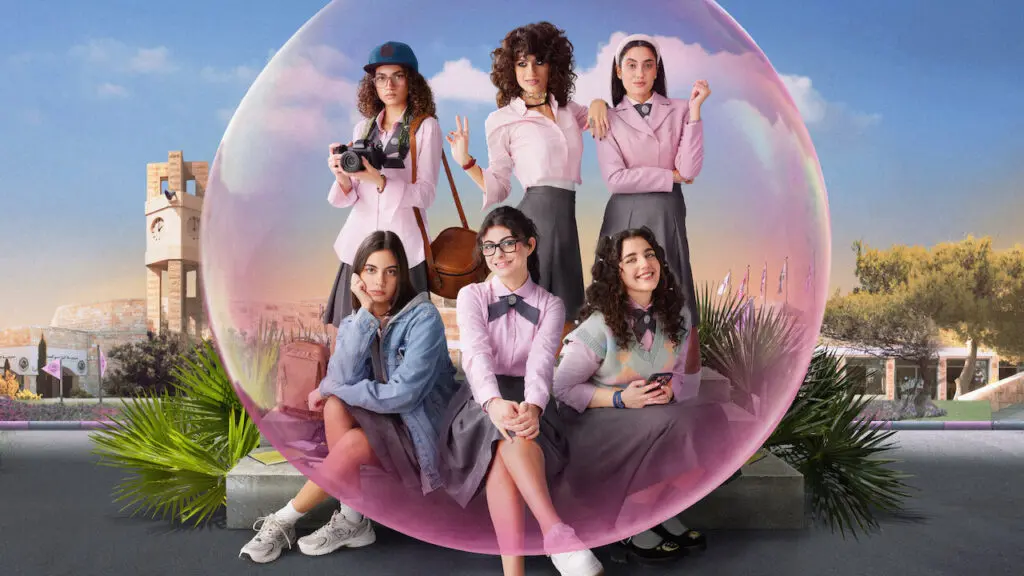Summary
AlRawabi School for Girls delivers another fine season, with a heartfelt and urgent take on pressing teen issues.
The first season of AlRawabi School for Girls, a Jordanian series created for Netflix by Tima Shomali, was a surprisingly strong take on an oversaturated genre. Set in a fictional school for upper-class teen girls, it was a cautionary tale about bullying and revenge that turned out to be popular enough for a renewal, despite only being planned as a limited series. Season 2 has now arrived and delivers another excellent, timely tale of rebellion, always-online vapidity, and brutal teen torment filtered through the specific lens of a wildly conservative culture.
Season 2 returns to the same school but focuses on a new class of students (though Season 1’s cliffhanger ending is addressed.) We primarily follow Sarah (Tara Abboud), a well-intentioned girl from a lower-income family who is dissatisfied with life as a nobody. Against the wishes and advice of her best friend Nadeen (Tara Atalla), Sarah does everything she can to go viral, earning the attention of moneyed queen bee Tasneem (Sarah Youseff) and her mean-spirited best friend Hiba (Kira Yaghnam).
Sarah’s desperation to be seen primarily manifests as a desire for social media attention. Tasneem is especially compelling to her not just because she’s smart and popular in real life but because she’s a big deal on TikTok, and it’s this trend of defining oneself by their follower count that particularly perturbs Nadeen. You can see what’s coming before it happens; Sarah and Tasneem become friends while Nadeen and Hiba are left out in the cold, with rapidly spiraling consequences for everyone involved.
The first half of AlRawabi School for Girls Season 2 is perhaps a bit too familiar for its own good since this stuff is par for the course in the genre. A naïve girl changes who she is to fit in with the cool kids and ostracises her real friends in the process is the oldest plot in the book. But the point isn’t just what Sarah will do to gain followers, but also to keep them, and to maintain her newfound social standing. This is where Season 2 gets especially interesting since it plays on Jordanian cultural conservatism with its own take on a revenge porn plot.
As the stakes heighten, the characters reveal new layers – most of them, anyway. Nadeem befriends a tech-savvy loner who is the secret sister of Tasneem’s boyfriend and is prepared to go further to expose the TikTok clique than Nadeen is particularly comfortable with. Meanwhile, Tasneem herself reveals deeper issues that go some way toward explaining why she is the way she is. It’s only Hiba who feels like an afterthought, and thus a little too much like a cartoon villain so needlessly spiteful that she seems to exist only to keep the plot moving.
There’s also no arguing with how timely the show’s themes are. As a father to two girls, one of whom is a teenager and the other of whom is right on the cusp of becoming one, I’ve seen firsthand how utterly all-encompassing a phone screen can feel. One of the few returning characters, the kindly but stern teacher Ms. Abeer, puts it best when she says how tired she is of watching these girls make such fools of themselves just to impress people online.
Not new, but necessary
Shomali’s writing remains the sharpest arrow in the quiver of AlRawabi School for Girls, and her deft understanding of this generation makes even the most familiar plots and themes feel heartfelt and necessary. This is as compelling as teen dramas get in many ways and with none of the lurid sensationalism that blights higher-profile Western examples like Euphoria and Sex Education.
A smart structural choice – teasing the outcome of Sarah’s actions long before she becomes the villain of her own story – will ensnare audiences, but it’s the writing and direction that’ll keep them around until the end.
RELATED:
- AlRawabi School for Girls Season 2 Ending Explained
- Will there be an AlRawabi School for Girls Season 3?




